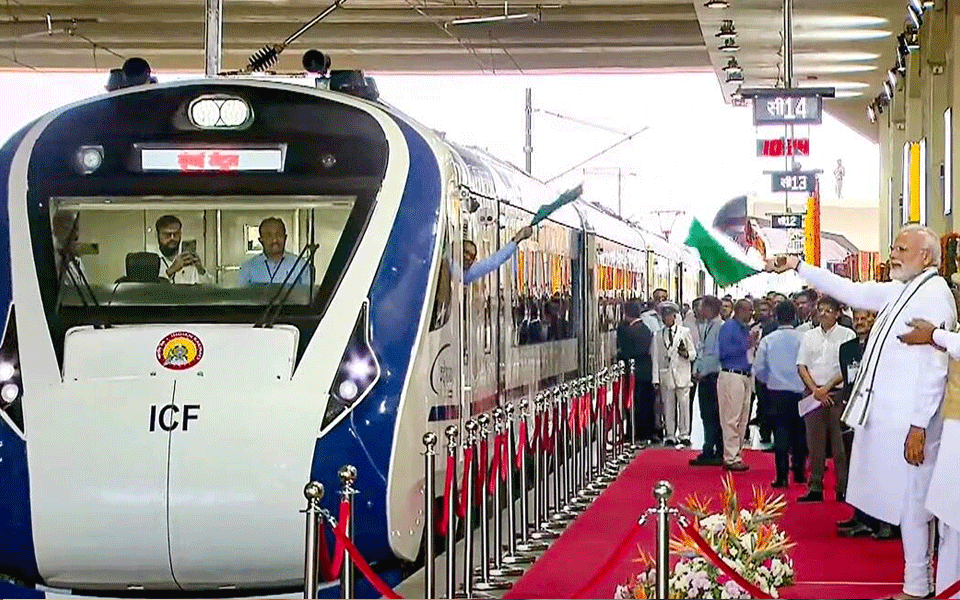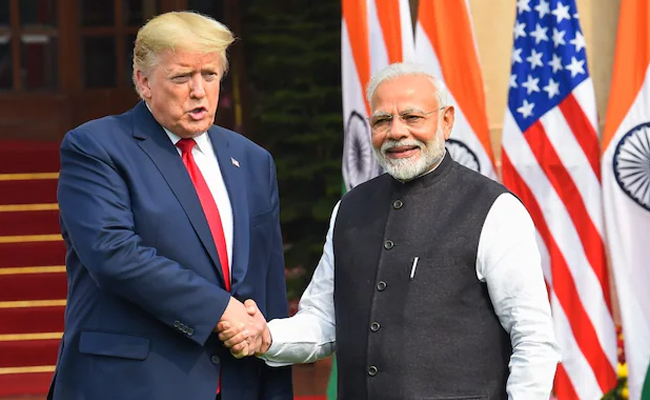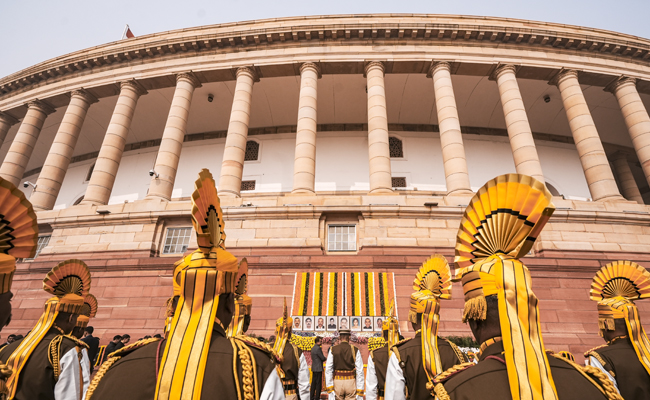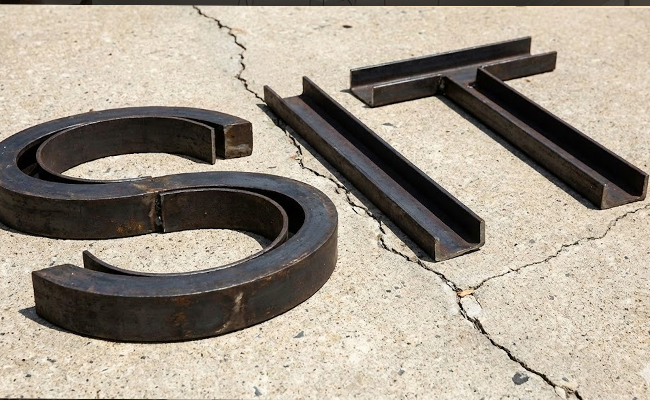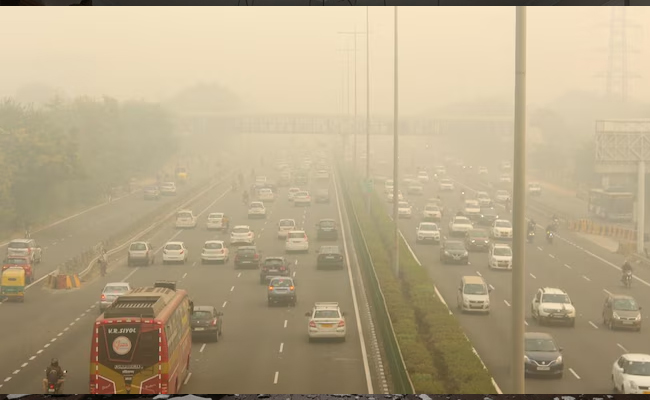Ahmedabad (PTI): Prime Minister Narendra Modi on Friday flagged off the Gandhinagar-Mumbai Vande Bharat Express, a semi-high speed train, and travelled in it from the state capital to Kalupur railway station in Ahmedabad city.
Modi flagged off the train from Gandhinagar Capital railway station around 10.30 am before boarding the train.
"PM @narendramodi is on board the Vande Bharat Express from Gandhinagar to Ahmedabad. People from different walks of life, including those from the Railways family, women entrepreneurs and youngsters are his co-passengers on this journey," the Prime Minister's Office (PMO India) said in a tweet.
In the photographs attached with the tweet, the prime minister is seen interacting with the railway officials, women entrepreneurs and others on board.
The train, which connects the capital cities of Maharashtra and Gujarat, is the third Vande Bharat Express in the country. The first such train was started on New Delhi-Varanasi route, while the second one on New Delhi-Shri Mata Vaishno Devi Katra route, an official said.
The train will provide passengers aircraft-like travelling experience and advanced safety features, including Kavach technology, an indigenously developed Train Collision Avoidance System, he said.
"This train will offer world-class comfort and facilities to passengers. The fully air-conditioned Vande Bharat has several modern features, such as sliding doors, personalised reading lights, mobile charging points, attendant call buttons, bio-toilets, automatic entry and exit doors, CCTV cameras, reclining facility, comfortable seats," a release by the railways said.
Train number 20901 Mumbai Central-Gandhinagar Capital Vande Bharat Superfast Express will start its commercial run from October 1. It will operate six days a week except Sundays. The train will depart from Mumbai Central station at 6.10 am and reach Gandhinagar at 12.30 pm. For the return journey, the train will depart from Gandhinagar at 2.05 pm and arrive at Mumbai Central at 8.35 pm.
It will halt at Surat, Vadodara and Ahmedabad stations in both directions.
Vande Bharat Express is an indigenously designed semi-High speed self-propelled train set of 16 coaches. The train reaches 160 kmph speed in just 140 seconds and it has better riding comfort for passengers at 3.5 (riding index).
The fare for Mumbai-Ahmedabad journey by executive chair car will be Rs 2,505, while that for chair car will be Rs 1,385.
The railways has rescheduled Mumbai-Ahmedabad Shatabdi Express to accommodate Vande Bharat Express.
The train has a Coach Control Management System for monitoring air-conditioning, communication and feedback to control centre/maintenance staff through GSM/GPRS. It is fitted with Passenger Information and Infotainment System in every coach, the official said.
Equipped with automatic plug doors with sliding footsteps and touch-free sliding doors inside coaches, the seats inside the executive class are revolving.
This is the first train with aeroplane-like bio-vacuum toilets with touch-free amenities and also has a special lavatory for divyang (specially-abled) passengers. The seats' handles are provided with seat numbers in Braille letters to assist the visually-challenged passengers.
The train is equipped with Kavach safety system. The coaches have emergency talk back units.
The train has better flood proofing for under-slung electrical equipment that will withstand floods up to a height of 650 mm.
Let the Truth be known. If you read VB and like VB, please be a VB Supporter and Help us deliver the Truth to one and all.
New Delh (PTI) The Congress on Saturday said it is perhaps not very surprising that India is not part of a US-led strategic initiative to build a secure silicon supply chain, given the "sharp downturn" in the Trump-Modi ties, and asserted that it would have been to "our advantage if we had been part of this group".
Congress general secretary in charge of communications Jairam Ramesh took a swipe at Prime Minister Narendra Modi, saying the news of India not being part of the group comes after the PM had enthusiastically posted on social media about a telephone call with his "once-upon-a-time good friend and a recipient of many hugs in Ahmedabad, Houston, and Washington DC".
In a lengthy post on X, Ramesh said, "According to some news reports, the US has excluded India from a nine-nation initiative it has launched to reduce Chinese control on high-tech supply chains. The agreement is called Pax Silica, clearly as a counter to Pax Sinica. The nations included (for the moment at least) are the US, Japan, the Republic of Korea, Singapore, the Netherlands, the United Kingdom, Israel, the United Arab Emirates, and Australia."
"Given the sharp downturn in the Trump-Modi ties since May 10th, 2025, it is perhaps not very surprising that India has not been included. Undoubtedly, it would have been to our advantage if we had been part of this group."
"This news comes a day after the PM had enthusiastically posted on his telephone call with his once-upon-a-time good friend and a recipient of many hugs in Ahmedabad, Houston, and Washington DC," the Congress leader asserted.
The new US-led strategic initiative, rooted in deep cooperation with trusted allies, has been launched to build a secure and innovation-driven silicon supply chain.
According to the US State Department, the initiative called 'Pax Silica' aims to reduce coercive dependencies, protect the materials and capabilities foundational to artificial intelligence (AI), and ensure aligned nations can develop and deploy transformative technologies at scale.
The initiative includes Japan, South Korea, Singapore, the Netherlands, the United Kingdom, Israel, the United Arab Emirates, and Australia. With the exception of India, all other QUAD countries -- Japan, Australia and the US -- are part of the new initiative.
New Delhi will host the India-AI Impact Summit 2026 on February 19-20, focusing on the principles of 'People, Planet, and Progress'. The summit, announced by Prime Minister Narendra Modi at the France AI Action Summit, will be the first-ever global AI summit hosted in the Global South.
Prime Minister Modi and US President Trump on Thursday discussed ways to sustain momentum in the bilateral economic partnership in a phone conversation amid signs of the two sides inching closer to firming up a much-awaited trade deal.
The phone call between the two leaders came on a day Indian and American negotiators concluded two-day talks on the proposed bilateral trade agreement that is expected to provide relief to India from the Trump administration's whopping 50 per cent tariffs on Indian goods.
In a social media post, Modi had described the conversation as "warm and engaging".
"We reviewed the progress in our bilateral relations and discussed regional and international developments. India and the US will continue to work together for global peace, stability and prosperity," Modi had said without making any reference to trade ties.

